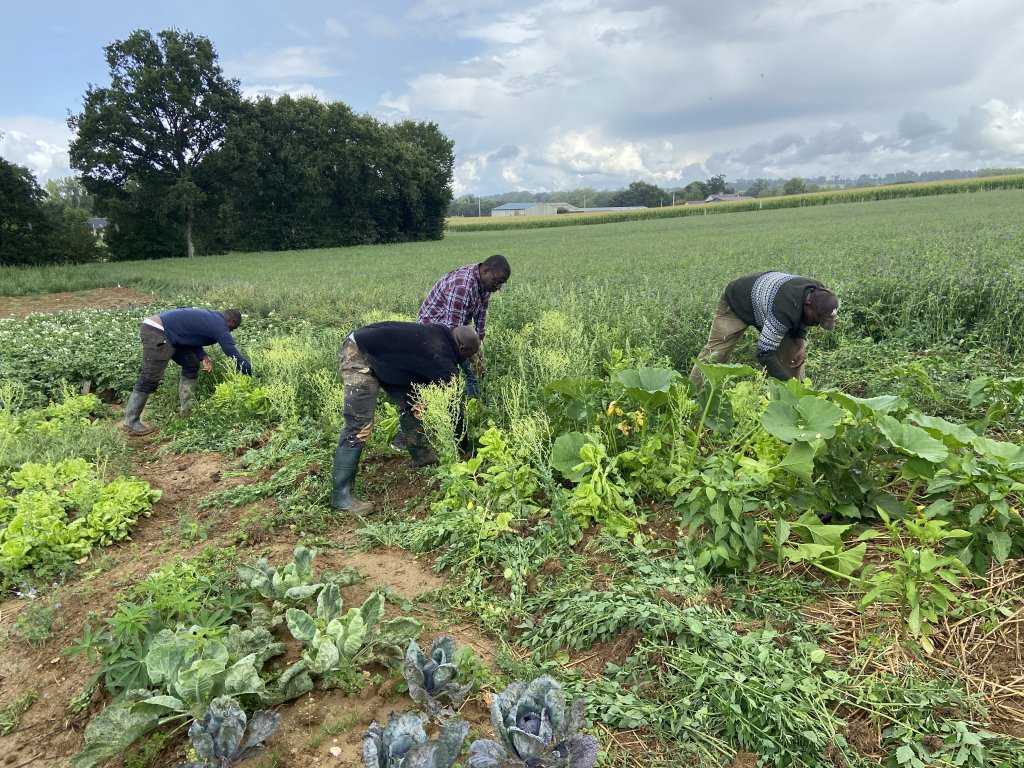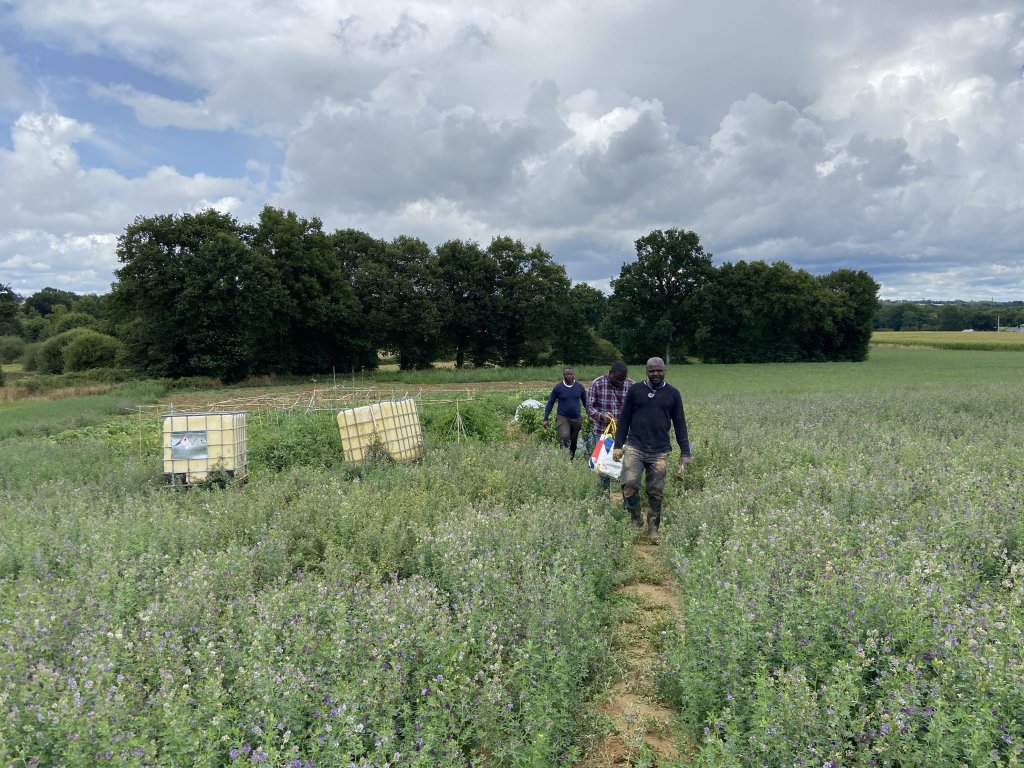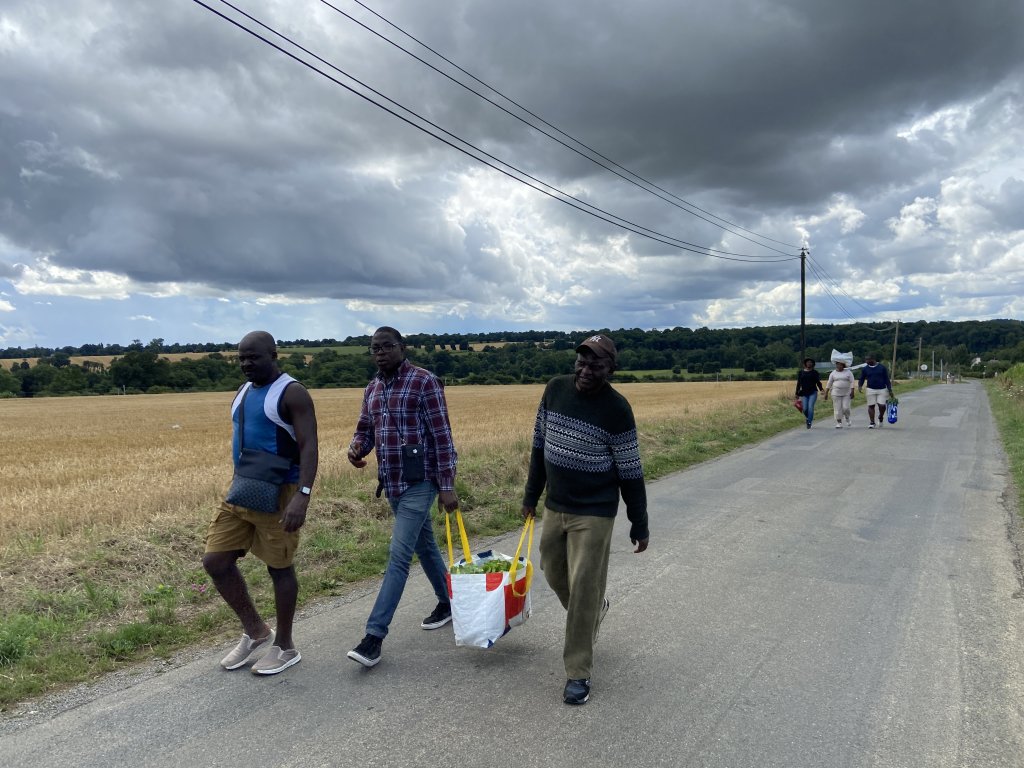InfoMigrants met migrants who found their path to fulfillment through agriculture. In Brittany, a group of asylum seekers started a market gardening project to "be useful to society".
The weather was changing rapidly on a July afternoon near the French city of Rennes. Rain showers were followed by sunshine, with strong rays that pierced through the gray clouds, making the sky look like an impressionist painting.
“We’re happy for the rain! It’s good for the vegetables and it saves us from having to water the land,” said Eddy Valère. The 41-year-old Cameroonian initiated a market gardening project last spring in the commune of Melesse, in northwestern France, along with ten other migrants.
Eddy Valère, Kassiri, Bena, Justine, David, Laurent and the other participants of the project met each other in the various housing setups where they lived since arriving in France, especially in the gymnasiums where Rennes housed migrants for several months this winter. Yet the shelters were evacuated in the beginning of April, prompting most of the exiles to move to Maurepas park (Parc de Maurepas), in northern Rennes.
Leaning over the ground, the migrant farmers turned the soil and pulled up weeds around the lettuce. In just four months of work, they had grown beautiful tomato plants, peppers, potatoes, zucchini, and eggplants on the plot surrounded by a field of alfalfa. At the ground level, big squashes were growing and slowly turning orange under large, dark-green leaves.

No access to the labor market
The Collective of Migrant Farmers arose from the desire of this handful of asylum seekers to keep their hands and minds busy while undergoing the long administrative procedures necessary for their new life in France.
"We don't have access to the job market [an asylum seeker in France only has the right to work after being in France for six months, if they are still waiting for the approval of their asylum application. Yet hiring remains extremely rare, editor's note]. We didn't want to remain idle. We started by contacting the city of Rennes to participate in the clean city operation, but the town hall never responded to us," said Valère, who was sitting in the shed of the nearby farm.
The project was able to come to fruition with the help of Maxim Barjou, a former agroforestry advisor. Barjou and Valère met last February during a documentary screening at a squatted house in Rennes.
"We were in the entrance of the squat and there were five or six people there, including Eddy. We started talking and we realized he was really interested in agriculture and that I worked in that domain, so we quickly connected," said Barjou.
Barjou was also a member of the Open and United Campaign Collective. The group was formed in Ille-et-Vilaine as a means to resist the rise of the far-right, between two rounds of legislative elections in June 2024.
"We organized a meeting in March with the Open and United Campaign Collective and the Collective of migrant farmers. It was an initial discussion to find out what their needs were. We later began searching for land through our contacts with farmers we knew in the area," said Barjou.
Retired farmer Sylvie Forel answered the call by making half a hectare of her land in Melesse available to the asylum seekers. Yohann Lehuger, her son, took over the farm with his father and a friend and supports the collective’s work.
‘Desire to be useful for society’
Some in the group already had experience in the world of agriculture. Eddy Valère and Bena, for example, completed agricultural training in Cameroon and in the Democratic Republic of Congo (DRC). Others learned while on the job, like Laurent, 68, a former physics and chemistry teacher from Cameroon, or Justine, a former receptionist from the Ivory Coast. Yet they all share the same desire to "be useful to society."
We want to “cultivate the land" and for "our products to go to people in need," said Valère.

The group is attached to the social dimension of the project: helping people in precarious situations to benefit from their production, cultivating according to the principles of biological agriculture, “to preserve the health of humans”. The collective offered the first vegetables they grew to the French charity Restos du Coeur, whose team regularly comes to the plot to pick up the produce.
Everyone expressed the desire to work so they could forget about their legal status. The migrants said they were consumed by anguish and boredom. All of them were either waiting for an appointment with the Ofpra, the public body responsible for processing asylum claims; a decision by the CNDA, responsible for examining the appeals of migrants present in France whose asylum demand was rejected by the Ofpra; or a residence permit.
“I come here for my mental health before anything else,” said David, 43, from Cameroon. “When I don’t come here, I stay at home and the days are too long. Here, the days go by fast, and I don’t ruminate too much.”
The need for tools
Bena also needs to occupy her mind. The former nurse who turned to market gardening in Kinshasa fled her country shortly after the conflict intensified in eastern DRC. “My husband is a corporal in the army, he was sent to fight there. I don’t know why but one day, people came to my house and attacked me, asking me why my husband wasn’t there.”
Bena was raped that day by one of her aggressors. “When the second man tried to rape me, I bit his hand with all my might, so he beat me up," she said in a low voice. She came to France with her teeth broken from the beating, and a deep wound on her leg which was making her suffer. Bena was able to receive physical treatment. Yet since her husband left, the Congolese woman has been experiencing severe headaches and high blood pressure. Market gardening helps her find peace.

The task is not easy: to get to the fields, the migrant farmers must take a 30-minute bus ride from Rennes, then walk 45 minutes. Once on site, they do all the work by hand with only a few tools, because the collective lacks everything. "We especially need hoses for watering," David said. To address the situation, the collective launched an online fundraising campaign.
The migrant farmers hoped the funds they received would help them sustain their project. The region could benefit from it. According to the 2025 Labor Needs Survey by France Travail (formerly Pôle Emploi), there are 8,950 recruitment projects in agriculture in the Brittany region, with at least as many positions to fill. On the national scale, more than 200,000 recruitment projects have been registered in the agricultural sector.
The Collective of Migrant Farmers is doing its part. The Restos du Coeur came the following Tuesday to pick up vegetables grown in the Melesse field for the homeless and those with a low income. In a few months, the exiles would also like to be able to offer vegetable baskets to isolated people who live nearby.
